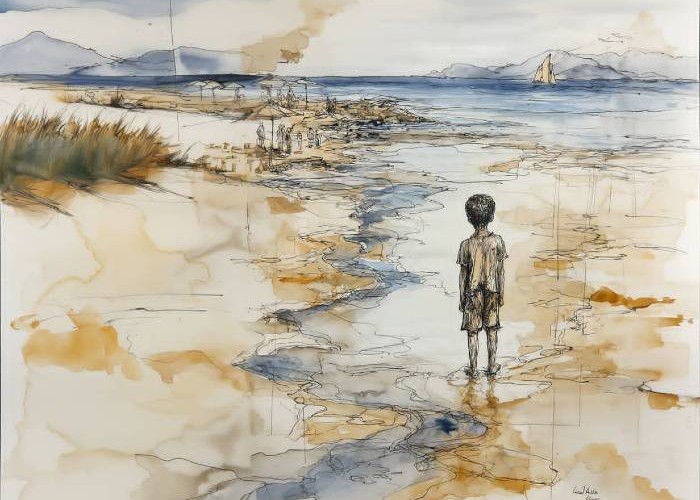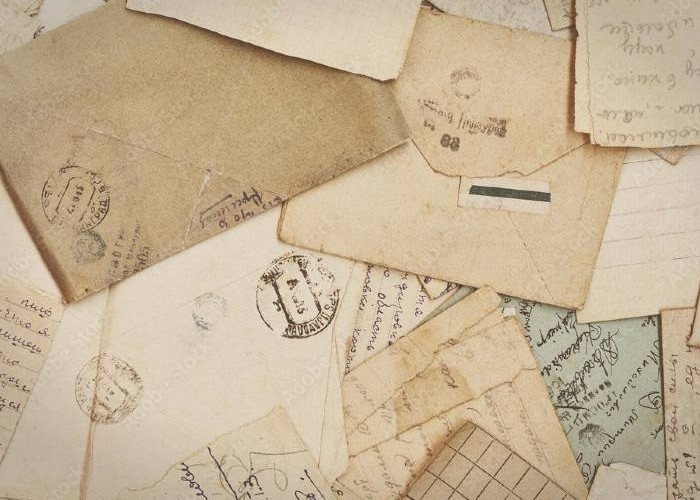1
“And now, ladies and gentlemen, I shall present to you the main surprise of the Festival… Of course, we saved it for the very finale… We hope that every single one of you has not only heard the name of this winner but experienced huge, incomparable pleasure from her screenplays… Meet… The queen of dots and commas… quotes and poly dots… On stage… Ms… Pally!!!! Applause!”
That’s me. That’s the way Americans pronounce my last name: Pally. The palace is in the mountains of Italy, but the owners of the palace and the managers of the Festival are Americans. The audience is international.
The speech is given by the Festival’s general manager, Mr. Brown. Everyone else was honored by the middle manager, Mr. Johnson.
“I must say, gentlemen, that in the person of Miss Pally we see a talent … a true diamond … who … while ….”
He reads from a piece of paper.
“… who I would call a true Russian nugget…!”
I shudder. Even more than before. I’m standing in a circle of light. Some people in the front row stare at me incredulously.
“… and this Russian nugget, a genuine Russian nugget… who… uh… has been working in literature for a quarter of a century… has honored us with her presence. And now we… and now the international jury awards Ms. Palei… the gold medal of the Festival!!!! Applause!!!”
2
The junior manager walks behind me, dragging, with visible effort, a mountain of bouquets that sprawl in his hands. A beautiful basket of roses dangles from his elbow. We enter my luxurious suite, and the junior manager immediately rushes to fill vases with water. He thoughtfully arranges them around the room. He bows respectfully and disappears.
There’s only one thing that confuses me about this situation. Don’t they know I have to leave for the airport in an hour?
3
I don’t like cut flowers. I pity them. What will happen to these bouquets? Will they be thrown out in the trash? Or will the savvy managers use them again? After all, a movie conference is about to begin… Reusable bouquets? And at the same time, a purely Russian thought occurs to me: or perhaps to the cemetery…?
Internal phone rings:
“Ms. Pally, this is junior manager Smith speaking. Your chauffeur will be here any minute.”
I start packing my suitcase.
4
In high, thin heels, carrying a tiny silver purse, I walk slowly down the marble staircase. I am reflected in a multitude of mirrors. Behind me, a junior manager is dragging my suitcase. And I walk in front of him, light, graceful, with a beautiful basket of roses carelessly hanging from the bend of my elbow. They are planted in the ground, which means they will live. I never walked so light! At this moment, I remind myself of a young French woman in a French movie. The woman is leaving her husband for good. She throws an elegant volume of Verlaine and her favorite pink scarf into a wicker basket a packet of galettes. She takes with her only a white fluffy dog, the size of a tea strainer.
5
We pass a doorman wearing the uniform of an American Navy sailor. The doorman stretches out and salutes me. The junior manager hands my suitcase to the chauffeur, smiles respectfully, shakes my hand, and leaves.
In front of the palace gate stands a snow-white Mercedes. I have time to think anxiously about the “serpentine” road, where, I know myself, I will feel very ill and will have to somehow restrain my nausea – I only have time to think about it, when I see, as if in slow motion, that the suitcase in the hands of the chauffeur separates from its handle, crashes to the ground, jumps up, opens sharply, and my belongings fall out.
6
I don’t try to realize the horror of the situation. Quite the opposite: I turn off my senses. With an effort of will, I turn off the thought that when I miss my plane, no one will buy me a second ticket. And in the Netherlands, if I miss that plane, only a cab will take me to my neck of the woods. Which I can’t afford.
I gesture to the chauffeur to get in the car. Lacy bras are scattered around the suitcase, mixed with loofahs, medicines, a weekend dress, a hair dryer, and pages of a report.
7
I walk quickly back to the palace. I want to enter, but the doorman, in the uniform of an American Navy sailor, sharply blocks the door with his hand.
“I’m in trouble,” I say. (I hate this turn of phrase, it disgusts me. I say it on purpose to distance myself as far as possible from myself.) “Let me see the junior manager, my suitcase is broken!”
“I’m sorry, ma’am. I have no right.”
“What do you mean? I’m in trouble!”
8
My belongings look strange on the marble slabs of the garden, especially from afar. It’s as if I, with my belongings, have brought war, poverty and mayhem into this paradise.
“Let me call the junior manager, Mr. Smith.”
The doorman picks up a mobile intercom and presses a button.
“Mr. Smith, this is Jack. There’s some woman here who wants to come through to the palace.”
“What woman? What are you talking about?”
“I don’t know, Mr. Smith. She’s carrying a basket of roses.”
“Ask her what her last name is.”
“I’m Miss Pally! – I shout in desperation. – Mr. Smith, I’m Miss Pally!”
9
“Jack, put her on the phone.”
The doorman is putting me on the phone.
“Mr. Smith, my suitcase is broken.”
“What’s your last name, ma’am? One more time, please.
“I’m Miss Pally.”
“What can I do for you, Miss Pally?”
“My suitcase is broken. It’s a suitcase without a handle. And it must have a broken lock. I can’t go to the airport!”
Silence.
“Wait, Ms. Pallidge.”
“Miss Pally.”
“Miss Paly, your suitcase is broken. Why are you talking to me? We’re in the middle of a conference of film historians. What exactly is it that you want me to do?
“I’d like to come in and talk to the middle manager,” Mr. Johnson.
“I’m very sorry, Ms. Palei, but your event is over. Your time at the palace is up.”
I can see from afar the wind blowing the pages of my report. That’s fine.
10
“Mr. Smith, if I’m not allowed in, then I’ll continue on the phone. I call for the middle manager, Mr. Johnson.”
The basket of roses is very much in my way, but something has happened to my brain: I cling to it, not realizing that the basket can be put on the ground. It’s as
if that basket is the final proof that I am Ms. Pally. The middle manager comes to the phone surprisingly quickly.
“Mr. Johnson, it’s Miss Pally! My suitcase is broken! I can’t go to the airport!”
“Wait…which Ms. Palley is this? Are you from California?”
“No, I’m from the Netherlands! And now I’m standing at the entrance to the palace. What am I supposed to do?”
“Wait… Is your suitcase broken? Tell the chauffeur, he knows a leather goods store in town. You’ll be able to buy yourself a fine suitcase there, Miss Palei! I guarantee it. Any other questions?”
11
I can see it’s going to rain. I’ll probably miss my plane. If only because the car will go twice as slow on the serpentine road in this weather. I feel crushed ice in my stomach.
“Mr. Johnson, the thing is, yesterday– yes, yesterday– uh. I had a problem with my bank card. There was a glitch in the electronic system. I… uh, I can’t make a withdrawal!”
“Ms. Pally, these electronic glitches don’t last more than a few hours. I can guarantee you that! Any other questions?”
“Isn’t there a bag for me at the palace?”
“What? I don’t understand.”
I want to clarify: well, something large, like a shuttle bag, anyway. (Lord, Thy will, I can’t believe I’m having these Russian thoughts!)
“Mr. Johnson, I can spell it for you.”
“Yes, I can hear perfectly well, but you probably have your purse, ma’am. There’s no purse in your apartment. It’s been cleaned. Any other questions?”
“I’d like to speak to the senior manager, Mr. Brown, please.”
“I’m sorry, Ms. Pally, but he’s busy.”
“Mr. Johnson, do you have any rope? A good, strong rope?”
“What?”
12
It’s starting to rain. I see the chauffeur jumping out of the car, throwing my belongings into a suitcase, putting his arms around the suitcase and pulling it against his chest to the trunk. Then he runs up to me – and drags me into the car. That is, he would like to drag me, but I resist, clutching the basket of roses. Which is not an easy thing to do for me, in my high heels. But we don’t move for a few seconds. The rain is pouring down on us. The doorman takes the phone away from me, slides into the vestibule between the doors, stands to attention and stares at nothing. I remember that when I came here, it was raining too. The same doorman came out to me with a big white umbrella and led me respectfully from the car to the entrance. And now the chauffeur and I are standing in front of the palace, in the rain – two drenched figures of Italian neo-realism.
13
At last the chauffeur wins. Leading me, gutless, to the car, he says:
“Don’t worry, signora. I have a great idea!”
We get in the car, buckle up, drive off. I see my reflection in the mirror: the mascara from my eyelashes has turned into black tears across my cheek. A clown, what a clown! Seen through the eyes of a clown.
“What’s your idea, signor?”
He smiles at me with a white-toothed smile. He is a very handsome young Italian man, with a beautifully shaped head, with large masculine hands. He looks at me, radiating undisguised sympathy, winks and says:
“Now I’ll take the signora to a famous Italian leather goods store! It’s famous! Just down the road! She can buy the best suitcase there.”
_____________________________________________________________________________
NOTES
* “Suitcase without a handle” is an idiom in Russian. It means a useless thing which evokes pity and is not thrown out completely. In this story, the suitcase without a handle is a metaphor for a plight of an artist who is returning to her life of poverty after a brief shining.














































